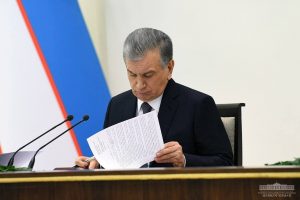Uzbek President Shavkat Mirziyoyev has signed into law a bill put forth by parliament last month that moves the country’s elections from December to October. Uzbekistan’s upcoming presidential election will now be held on “the first Sunday of the third decade of October” (“decade” here meaning a 10-day period): October 24, 2021.
Uzbekistan’s most recent national election was the parliamentary election held on December 22, 2019. The date ensured a cold election day and a dearth of Western observers, given the proximity to Christmas.
RFE/RL noted that “some critics in Uzbekistan say the true reason for the proposal was because December is when the government usually comes under harsh criticism over its continual poor handling of meeting heating needs as winter clamps down on the country.”
The specific impetus for shifting the date of the election is unclear, though the discussion is far from new. In previous discussions on liberalizing and reforming Uzbekistan’s electoral laws, moving elections from December to March was considered amid myriad other matters.
The bill Mirziyoyev just approved also contains reforms the Uzbek government says are based on recommendations from the OSCE’s Office for Democratic Institutions and Human Rights, dealing with technical issues like party financing and usage of state resources.
The bill contains several adjustments at least cosmetically aimed at observers. For example, under the previous law organizations interested in observing an election had to inform the relevant election commissions at least 15 days before the election; under the new law that period has been shorted to 10 days.
The bill also adds provisions specifically targeted at Uzbeks residing abroad, who were not directly addressed in much of the previous iteration of the law.
One notable inclusion in the amendments to the election law is an addition to Article 44, which addresses “pre-election agitation” (i.e. campaigning). The new bill adds a provision prohibiting state and local officials from “using their official position in favor of or against any political party or candidate,” as well as prohibiting religious leaders, members of the armed forces and law enforcement, including judges, from doing the same. This could be incredibly important, if enforced.
Mirziyoyev rose to power in 2016 after the death of Uzbekistan’s first president, Islam Karimov, and was elected president in December 2016. He is expected to run for a second five-year term. While it seems unlikely that Mirziyoyev will face any serious contenders, given the atrophied state of politics in the country, how the Uzbek state handles those who do throw their hats in the ring will be watched carefully by observers of the country’s reforms. Will challengers be permitted to step forward and present alternative views on Uzbekistan’s path forward? Will they be allowed to criticize the Mirziyoyev government in their effort to achieve office?

































